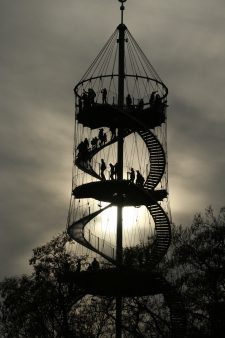Am I in an echo chamber?
2 July 2018
Spend enough time tracking the liberal and conservative media worlds, and you’ll notice a certain symmetry in their accusations. Each side thinks that the other is living in an echo chamber. Each side thinks the other is blind to the truth because their informational community has been corrupted. The usual thought goes something like this: when you’re in an echo chamber, you’re constantly surrounded by like-minded people, cut ourselves off from the other side. That kind of isolation leads to being both poorly informed and wildly overconfident. And that’s why the other side believes all those crazy things that they do.
If that’s a serious possibility, then each of us should then start to worry: maybe we, too, are already in an echo chamber. But how could we tell? First, we need to get clear on what exactly we’re talking about. I’ve written before about how writers and researchers are confusing two very different concepts: echo chambers and epistemic bubbles. A epistemic bubble is what happens when, say, all your reading and social media sources share your views, when secret algorithmic systems tailor your search results to fit your world view. You don’t have contact to the other side; you aren’t exposed to other arguments.
An echo chamber, on the other hand, is what happens when insiders are systematically brought to distrust all outsiders. An echo chamber is more like a cult. The problem isn’t that you don’t hear people from the other side; it’s that you’ve already been systematically prepared to disregard what they say. An epistemic bubble is a passive structure of omission; an echo chamber is an active structure of exclusion through discrediting. An epistemic bubble is a structure of bad information flow; an echo chamber is a structure of manipulated trust. Once you’re caught in the grip of an echo chamber’s world view, that world view will work to amplify itself. So long as those insiders continue preach distrust in the outsiders, than the echo chamber’s grip will only tighten.
So how do you tell if you’re caught in one? With an epistemic bubble, it’s relatively easy. Epistemic bubbles merely leave out relevant information and arguments, and they do so by pre-filtering your information flow. So take the filters off, and see if anything changes. Follow news feeds from radically different political sources, change up your media sources. If you’re liberal, read National Review and The Economist and follow some libertarians. If you’re conservative, read The Atlantic and Jacobin and follow some socialists. For both: follow some relevant feeds that are skew to the standard political angles, like aggregators for economics news, or legal policy wonks, or ecologists. Go to your Google account and turn off the personalization features. If, after a while of de-filtering your feed, you find consistently encounter new information and argument that change your mind, then it turns out that you’d been in an epistemic bubble after all — and you’ve already started to undo it.
With echo chambers, it’s much harder. If you’re in an echo chamber, you probably already know the other side’s arguments, and you have pre-arranged reasons to distrust their sources. If you’re in a climate change denial echo chamber, you’ve seen the evidence from the other side. You just think that the evidence — and the scientists in charge of interpreting it — have been corrupted. If you’re in a radical Marxist echo chamber, you know the standard arguments for a free market and the purported economic data; you just think that everybody gathering and interpreting that data have been corrupted by capitalism and neoliberalism. Exposure to those arguments won’t show you anything new; you’ve already been armed with reasons to dismiss them.
Perhaps we might think it’s the very attitude of distrust and dismissal that marks an echo chamber. Can we say that you’re in an echo chamber if you systematically distrust any outsider? That criterion, however, is far too broad. The problem is that healthy epistemic communities also engage in systematic distrust and dismissal. Think about what it’s like to be an expert — say, a medical researcher. Could you actually approach the world with an open mind and trust forever in your heart? Absolutely not. The world is full of crazies, weirdos, and quacks, each with their own nutty theories about medicine and health. You don’t have the time to check out each of their theories for yourself — you don’t even have the bandwidth to listen to most of them. Listening open-mindedly to anybody who thought they had something useful to say would chew up all your time and energy; the signal would drown in all that noise. You need to dismiss broadly and quickly. The way most medical researchers do it, by and large, is by narrowing their trust along institutional lines. They trust the people that publish at the right journals and have appointments at the right kind of universities and research institutes and ignore the rest. They have outsourced their trust to an institutional network; they have to, because science is so broad and specialized. And they are, let’s assume, an informationally healthy community.
So let’s fall back a step: the difference between an echo chamber and a legitimate, but exclusive, informational community is in the reason for distrusting others. An echo chamber dismisses outsiders just because they’re outsiders; a healthy informational community will try arrange their dismissals based on genuine considerations of reliability. The medical research community does some serious gatekeeping, but its efforts are hopefully not intended to simply exclude any outsider, period. Its gates are supposedly open to anybody who demonstrates enough knowledge; its boundaries are supposed to track genuine expertise.
The difficulty here is that echo chambers can engineer a world-view that justifies its harsh policy of dismissal. Consider, for example, philosopher Heather Battaly’s analysis of closed-mindedness. Closed-mindedness, she says, is the unwillingness or inability to engage with relevant intellectual options. Usually, it is an intellectual vice. However, she says, there are some special cases where closed-mindedness can be an intellectual virtue. Consider what she calls an epistemically hostile environment — an informational environment that is heavily polluted with false and misleading information. In that environment, being open-minded will tend to lead you astray. Adopting a general attitude of trust and willingness to engage will erode your confidence in your beliefs and weaken your self-confidence for bad reasons. Your good beliefs will be swamped by all the bad information flowing in from the outside. A propagandist, informationally corrupted society — like Nazi Germany or Stalinist Russia — counts as an epistemically hostile environment. If you were a freedom fighter in Nazi Germany, you should close your ears to all that outside propaganda, and only trust your small cadre of freedom fighters. Or, a bit closer to home: as Battaly points out, the current world is saturated with beliefs that discredit women and persons of color. Being open-minded, if one is a member of such a discredited group, courts terrible epistemic effects. So in a very narrow set of circumstances, closed-mindedness is an intellectual virtue.
But notice that many echo chambers present the world outside of their borders as precisely such an epistemically hostile environment. According to them, the outside world is entirely dominated by evil-doers, bad actors, propaganda, and vicious disrespect. Thus, an echo chamber can disguise its true nature by including, in its world view, a justification for its heavy-handed discredit towards the outside world.
My worry here is that echo chambers are informationally toxic; and that, once you’re in the grip of one, its world-view is structured to make its toxicity almost invisible. If that’s right, then somebody in an echo chamber’s grip can’t easily find their way out on their own. Once they’ve taken up the echo chamber’s world view, their continued belief isn’t just brute irrationality; it is the echo chamber’s belief structure judo-ing standard rational practices to reinforce its power – which includes the invisibility of its grip. Echo chambers trade on a clever manipulation of our natural need to trust. This is why, I think, echo chamber members cannot be expected to find their way out on their own. They need to be extricated. They need rescue from the outside, and that rescue should take the form of repairing that broken trust.
Image by Thaisun CCO Creative Commons from Pixabay
Comments
- October 2025
- September 2025
- August 2025
- July 2025
- June 2025
- May 2025
- April 2025
- March 2025
- February 2025
- January 2025
- December 2024
- November 2024
- October 2024
- September 2024
- August 2024
- July 2024
- June 2024
- May 2024
- April 2024
- March 2024
- February 2024
- January 2024
- December 2023
- November 2023
- October 2023
- September 2023
- August 2023
- July 2023
- June 2023
- May 2023
- April 2023
- March 2023
- February 2023
- January 2023
- December 2022
- November 2022
- October 2022
- September 2022
- August 2022
- July 2022
- June 2022
- May 2022
- April 2022
- March 2022
- February 2022
- January 2022
- December 2021
- November 2021
- October 2021
- September 2021
- August 2021
- July 2021
- June 2021
- May 2021
- April 2021
- March 2021
- February 2021
- January 2021
- December 2020
- November 2020
- October 2020
- September 2020
- August 2020
- July 2020
- June 2020
- May 2020
- April 2020
- March 2020
- February 2020
- January 2020
- December 2019
- November 2019
- October 2019
- September 2019
- August 2019
- July 2019
- June 2019
- May 2019
- April 2019
- March 2019
- February 2019
- January 2019
- December 2018
- November 2018
- October 2018
- September 2018
- August 2018
- July 2018
- June 2018
- May 2018
- April 2018
- March 2018
- February 2018
- January 2018
- December 2017
- November 2017
- October 2017
- September 2017
- August 2017
- July 2017
- June 2017
- May 2017


1 comment
Comments are closed.